When to transplant tomato seedlings – tips to get the timings right for potting up and planting out
Know when to pot up tomato seedlings to ensure you have strong and healthy plants
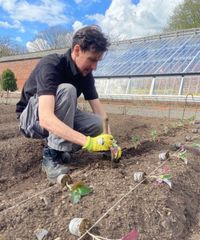
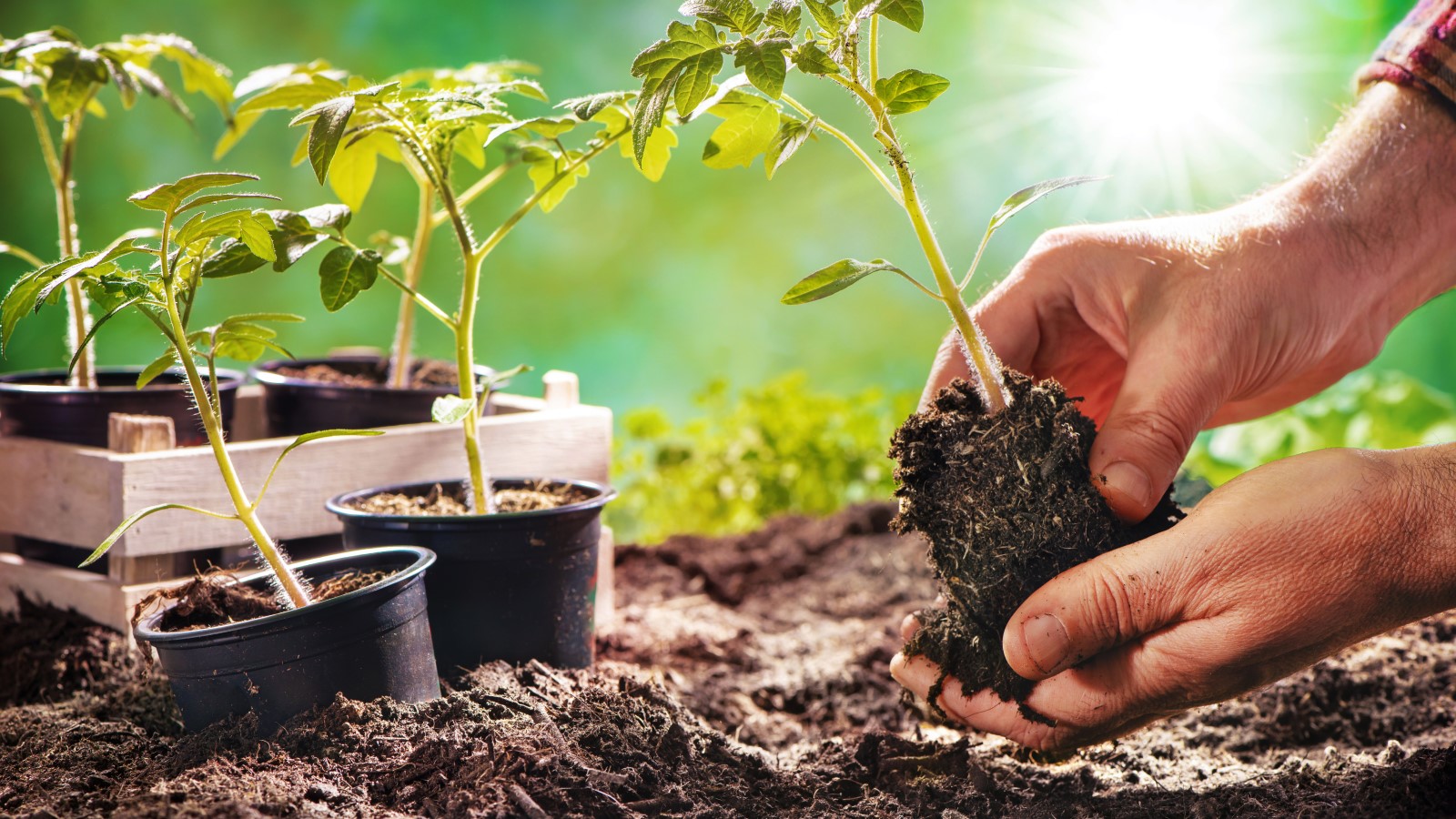
Tomatoes are a classic summer staple and the taste of homegrown tomatoes outshines any store-bought ones. Growing them from seed also opens up the potential to grow a much wider variety of tomatoes than you normally see on store shelves.
Growing tomatoes is a fairly simple process, the seeds germinate without fuss in the spring in a warm spot and grow quickly if you can provide them with the heat they require. When the seedlings are a few inches tall it is important to transplant them into individual pots to grow into healthy young plants.
If you are wondering when to transplant tomato seedlings into the garden, the answer is when the temperature gets warm enough – they thrive at 70˚F. Until then you pot them up, wait for the thermometer to rise, and then transplant them into their final growing spot, either in the greenhouse or outdoors.
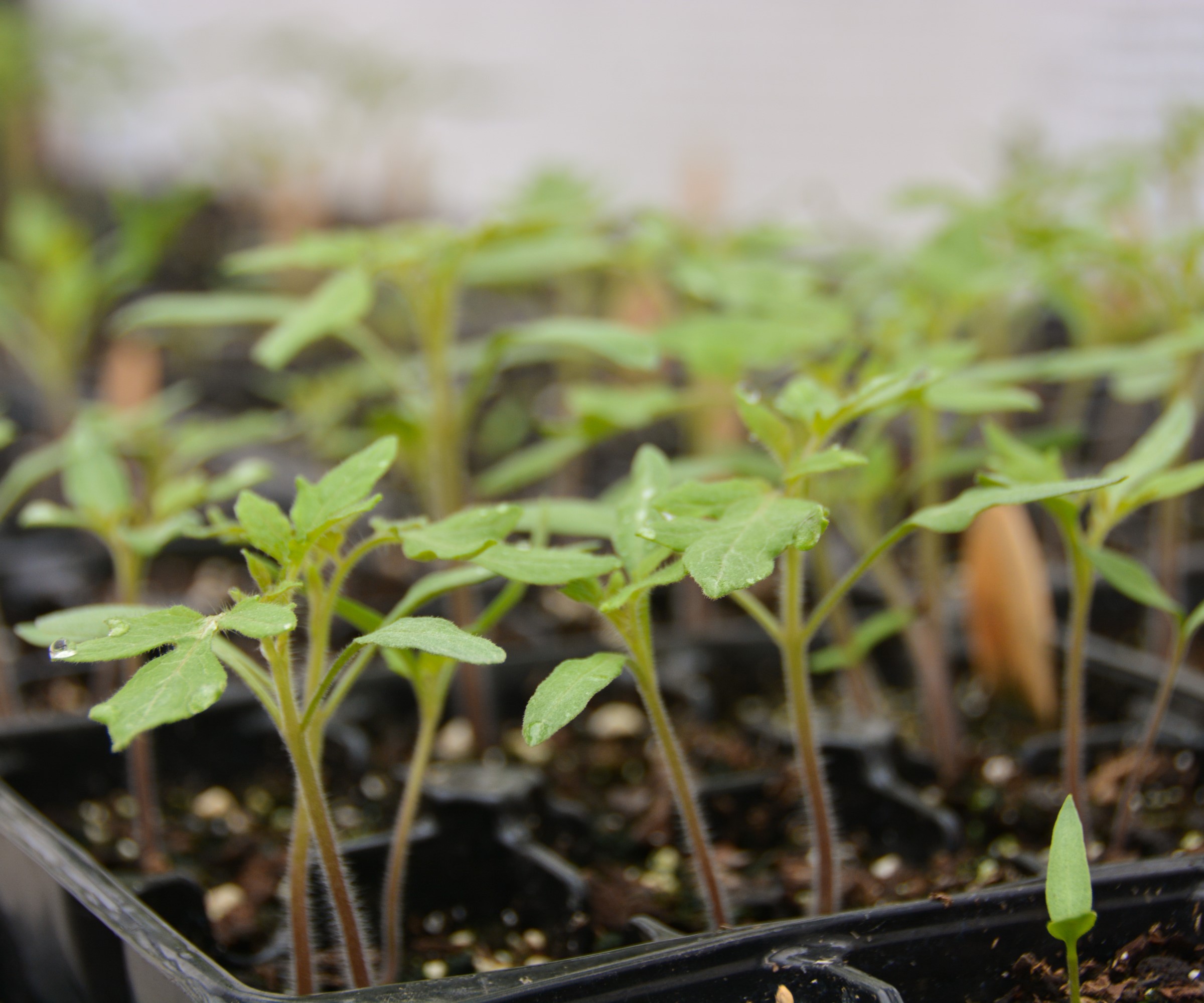
Tomato seedlings need transplanting into individual trays

Drew is a former professional gardener who has worked in historic gardens for the National Trust in the UK and also as a specialist grower in kitchen gardens, growing vegetables and fruit for chefs. He regularly grew tomatoes, and knows that getting the timing right for transplanting seedlings is key to how well they will grow.
When to pot up tomato seedlings
Knowing when to plant tomatoes is important to ensure that any potential crop is a success and there are a few key steps between sowing the seeds and planting those tomato plants into their final position.
To start off, tomato seeds are sown under cover in March and April, depending on your climate and growing zone, and they germinate successfully in temperatures of 64˚F to 77˚F. Tomato seeds germinate in under 10 days and will grow quickly in the right conditions, requiring them to be transplanted to a larger pot to continue growing. Transplanting the seedlings from the initial seed tray to a bigger pot ensures that each one has the room to develop into a healthy plant capable of succeeding in the garden and providing you with a great tomato harvest.
Tomato seedlings should be potted up when they are at least two inches tall and have developed their first set of true leaves. Bob Flowerdew, organic gardening expert for Homes & Gardens, warns about the risks of not potting up tomato seedlings once they are at the correct stage for pricking out.
‘Once tomato seedlings start developing beyond their seed leaves, they are ready,’ says Bob. ‘Moving sooner is better than later, as not separating seedlings early enough can be even more disastrous. Once they have started to develop beyond their seed leaves, seedlings are competing with each other in a way that is worse than weeds.’
Design expertise in your inbox – from inspiring decorating ideas and beautiful celebrity homes to practical gardening advice and shopping round-ups.
Competing for water and nutrients, especially in confined spaces, can cause tomato seedlings to turn yellow if they lack sufficient levels of either.
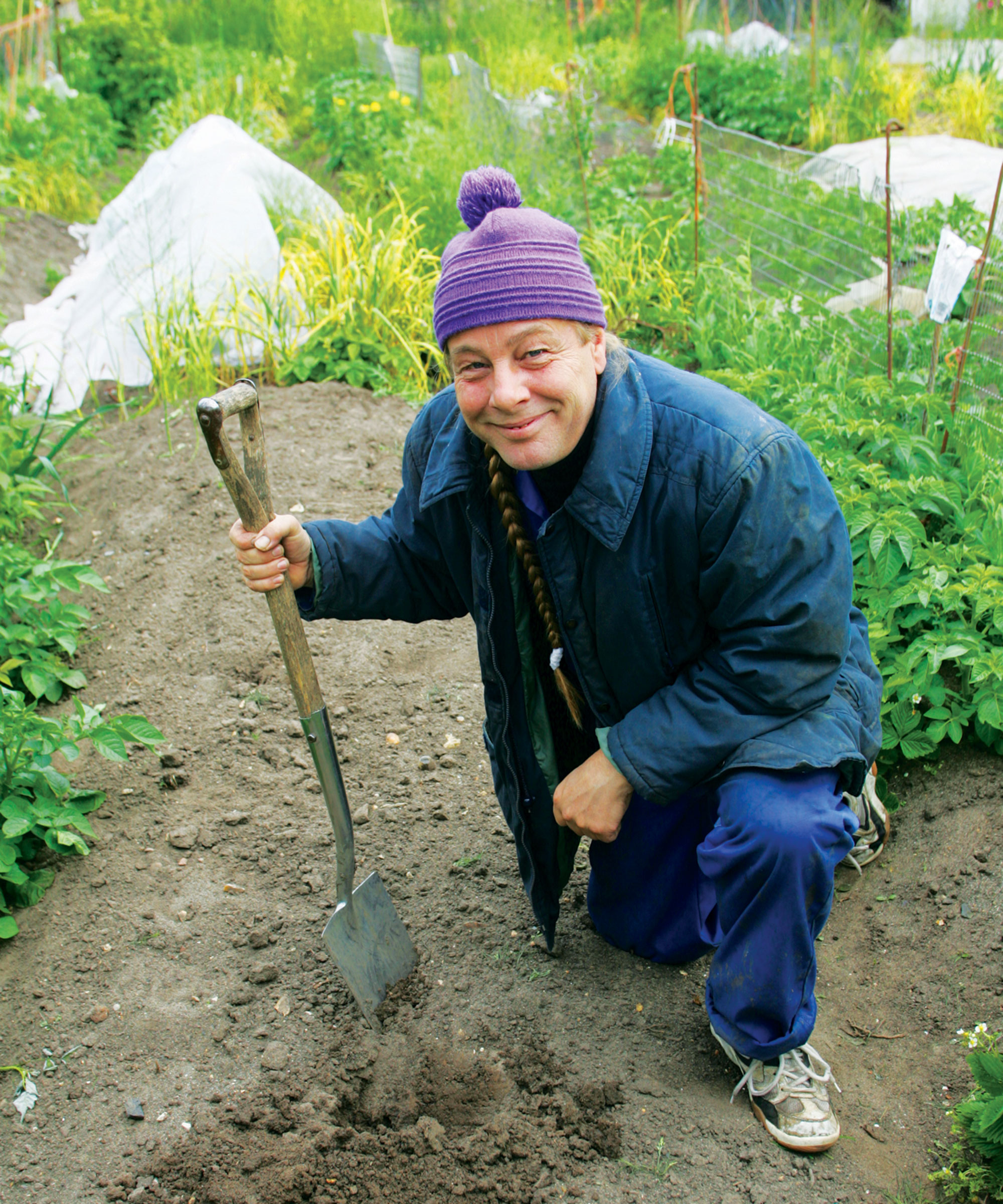
Bob Flowerdew is the organic expert for Amateur Gardening magazine in the UK. Every week he writes about a wide range of gardening tasks and offers advice on how to create a sustainble, eco-friendly garden. He has also written a wide range of books on organic gardening methods, all available on Amazon.
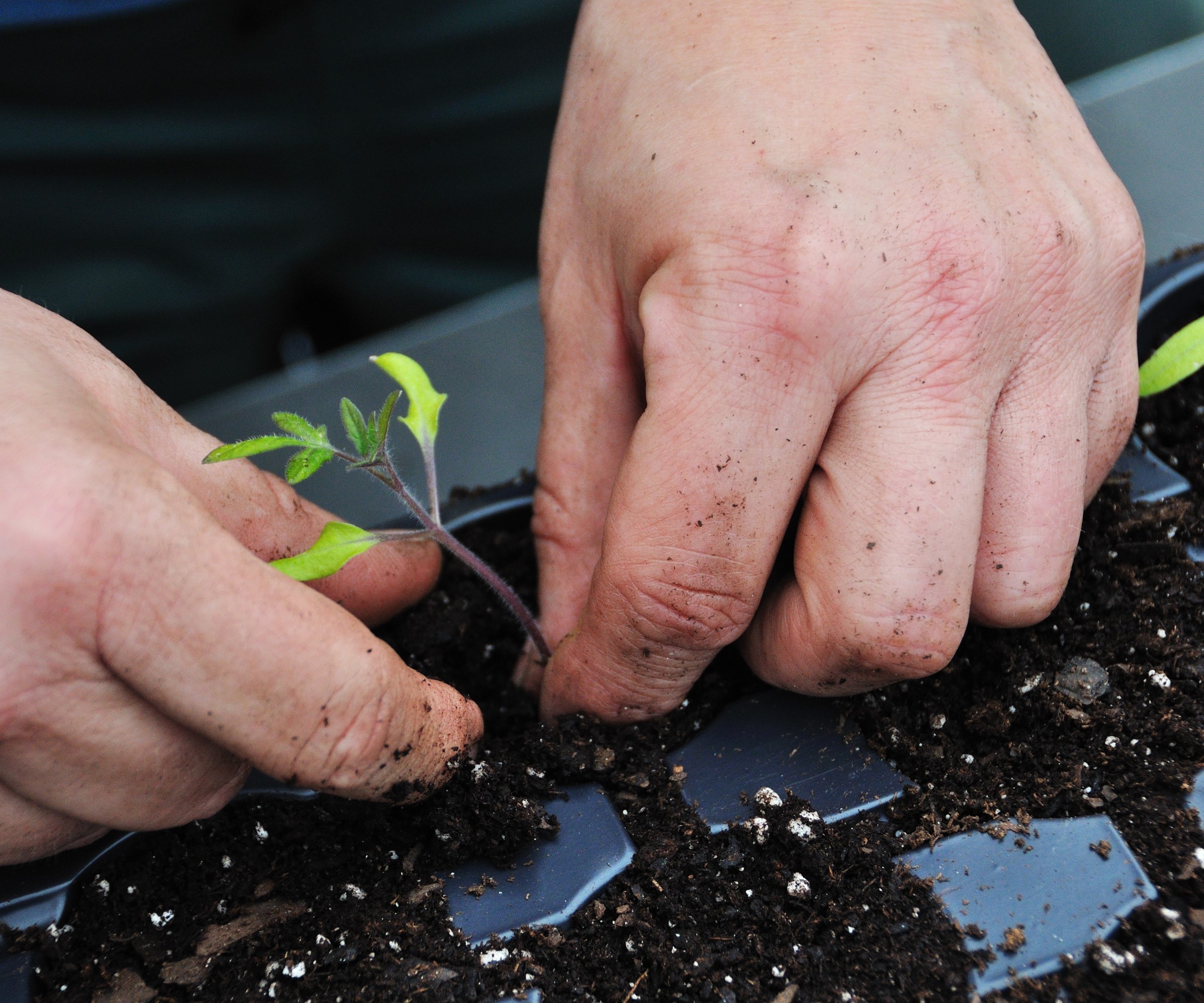
Take care when handling individual tomato seedlings
Transplant seedlings into their individual pots and keep them somewhere with good light and a temperature around 59˚F. Low light will cause the tomato seedlings to go leggy – growing very tall very quickly and with few leaves. Keep a good space between the plants and increase the spacing as they grow. Tomato plants can easily become tangled as they grow and by increasing the spacing you improve the airflow between the young plants.
Tomato plants grow rapidly and can potentially need repotting more than once before going into their final position. It could potentially mean two transplants from pot to pot, increasing the pot size each time. A good rule of thumb is to transplant a tomato plant when its height is three times the size of the pot’s diameter.
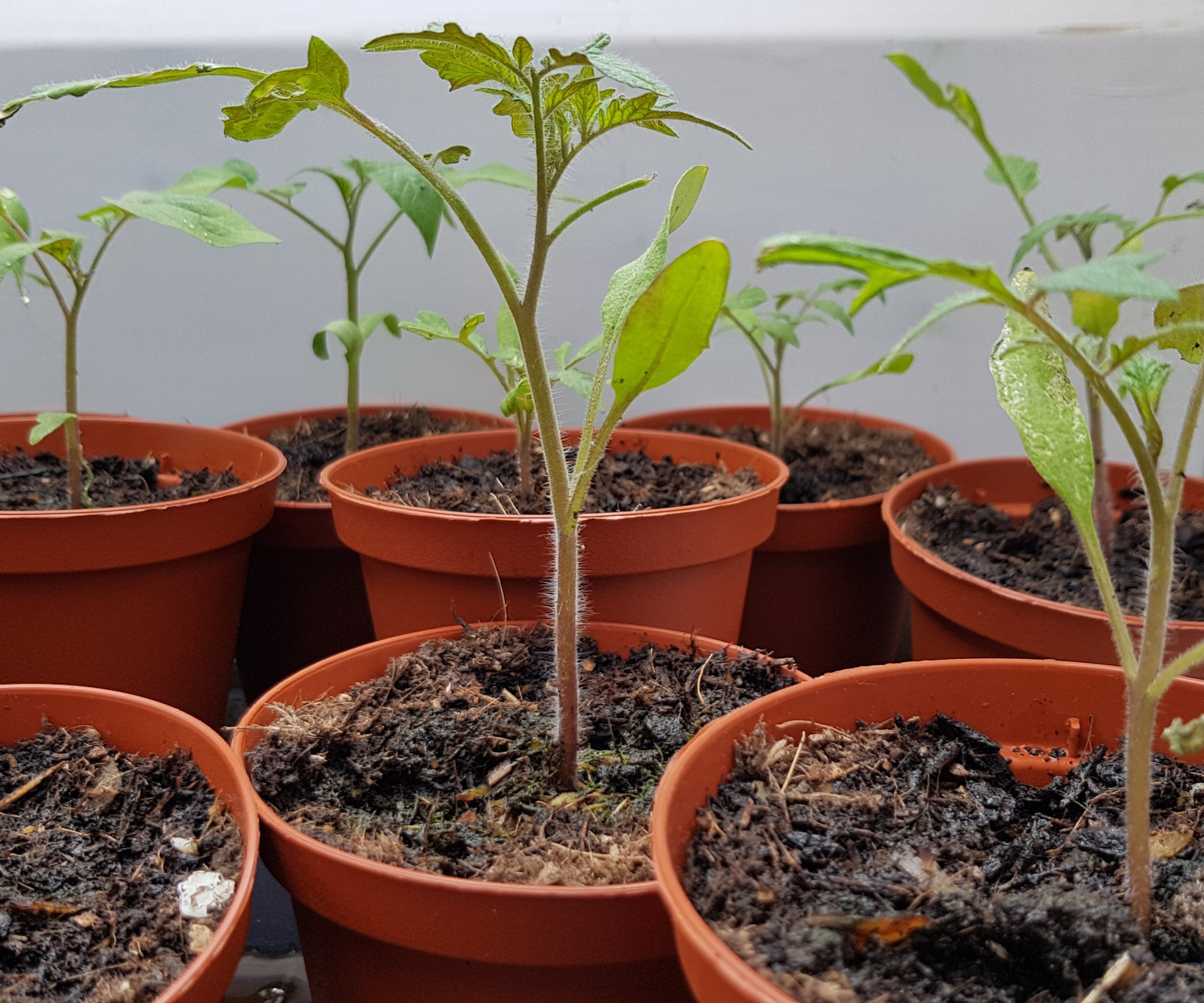
Tomato plants grow quickly when given light and warmth
How to transplant tomato seedlings from trays to pots
Tomato seedlings should be first transplanted when they are between two and four inches tall. The process is a fairly simple one. Transplant seedlings from their seed trays or modules into larger pots that are 3-4 inches in diameter, and use a good-quality potting compost.
Ruth Hayes, gardening expert for Homes & Gardens advises a simple four-step plan for potting up tomato seedlings:
- Fill the pots to the brim with the compost. Make a hole deep enough to take the roots and the seedling without curling.
- Hold the seedling by a cotyledon (seed leaf) and ease it out of its seed tray or pot, using a dibber or pencil.
- Plant them so that the cotyledons are sitting just above the surface of the compost. Do not firm them in – just water them in, gently.
- Check them every day, and give them a light watering as necessary. Make sure the leaves are dry before night falls, as if they are still wet they are more likely to rot or ‘damp off’.
Ruth warns that, as with pricking out any seedlings, it is vital that you make sure you are holding the young seedling by a leaf between the fingertips and ‘never holding the fragile stem as you might damage it which could kill the plant’.
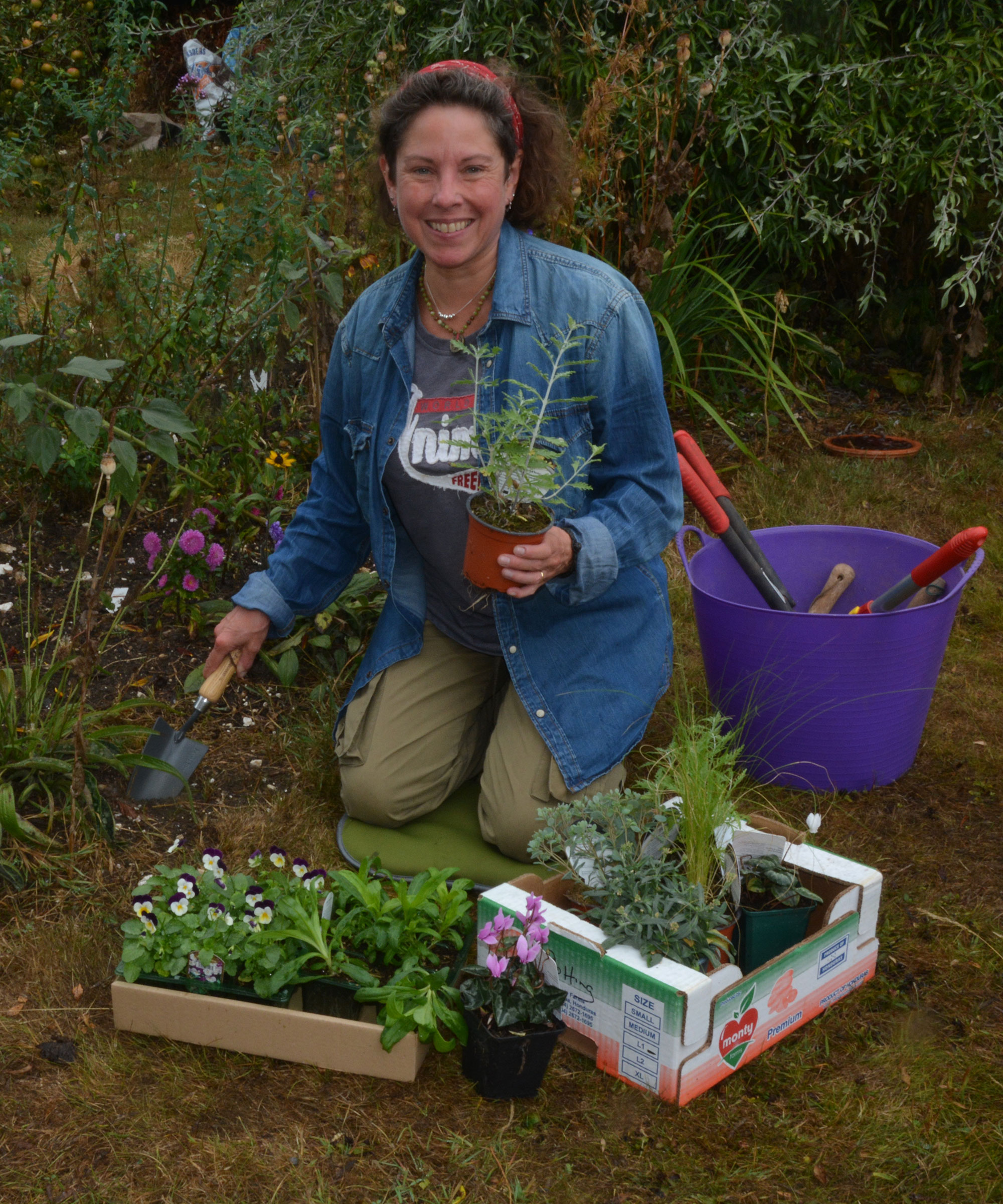
Ruth is the gardening editor of Amateur Gardening magazine, the UK's oldest weekly magazine. She is horticulturally trained and has qualifications from the Royal Horticultural Society. Ruth spends her working days writing about and photographing the gardening jobs that our readers should be carrying out each week and month, and tests many new products that arrive on the gardening market. She regularly grows her own crops, including tomatoes, both in her greenhouse and out in the garden.
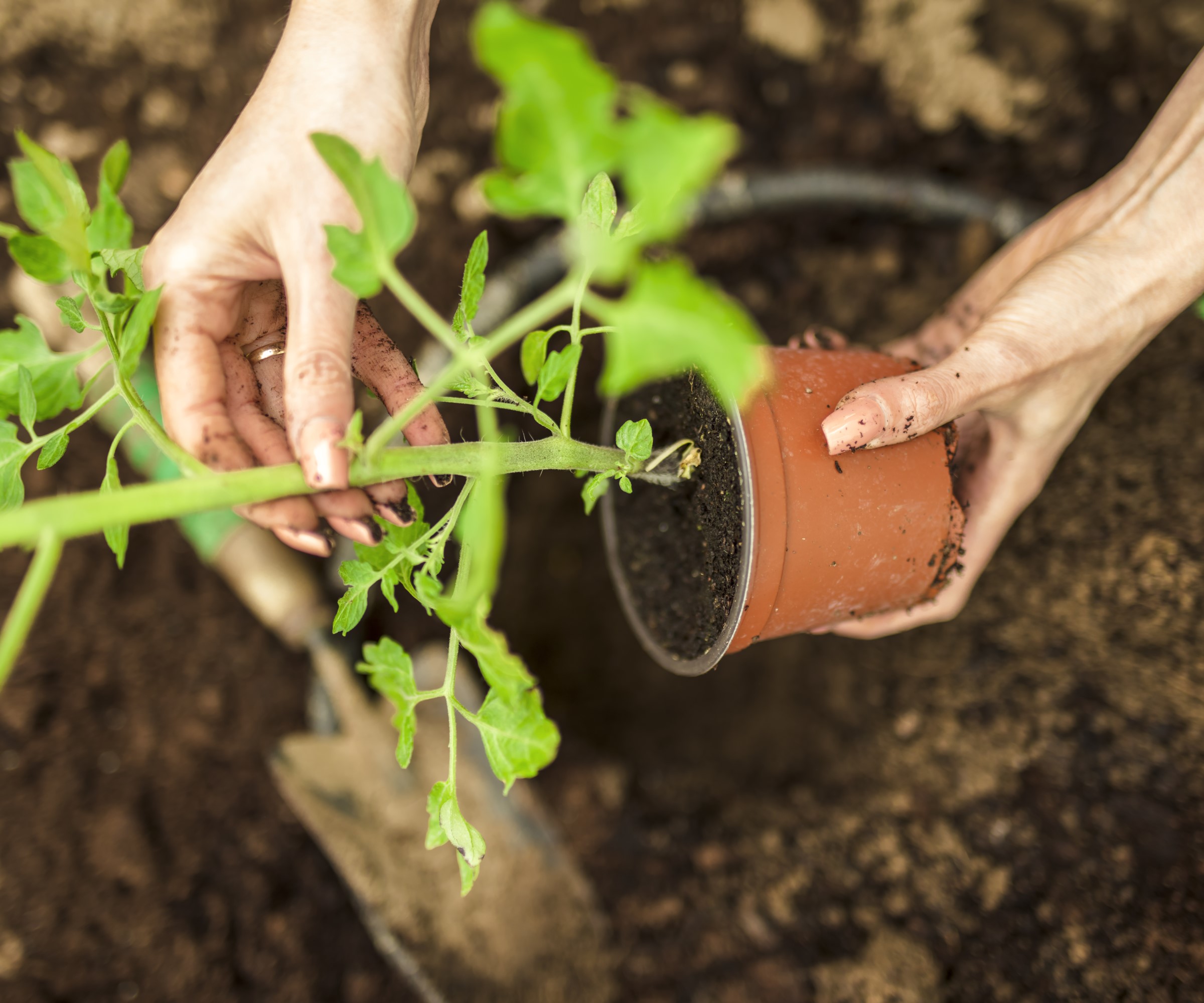
By 12 inches tall a tomato plant is ready to be transplanted into its final home
How to transplant tomato seedlings to their final location
A young tomato plant ready for transplanting into its final spot should be between nine and 12 inches tall. Individual plants are transplanted when the weather warms up to between 70 and 75˚F. Tomato plants can be transplanted into their final position in a heated greenhouse in late April or early May, while outdoor plants need to wait until night-time temperatures are above 50˚F – which can be a few weeks after the last frost.
If you are planning to grow your tomato plants outdoors, it is important to harden off the plants before transplanting seedlings them to their final position. Gradually acclimatize the plant to the outside conditions for a few weeks and ensure to not plant them until the last frost for your area. As well as in greenhouses and outdoor beds, tomato plants are perfect for growing in pots, or as part of a vegetable container garden, and are commonly grown in grow bags.
Make a large hole in the soil for the plant’s root ball, place it in the hole, and firm the plant into the soil. Consider mixing a handful of homemade compost into the soil before filling the hole to provide the young plants with some added nutrients. It is not necessary to provide young tomato plants with additional fertilizer at the time of planting. Water the young plant well and keep the soil moist but not waterlogged.
Tomatoes come in two forms, namely cordon and bush types – and the type you grow will dictate how to prune tomato plants. Cordon types of tomatoes grow as a single stem and need support to be trained to. This can be in the form of a trellis, frame or just a bamboo stick. An example of a plant support is the K-Brands Tomato Cage available at Amazon. It is recommended to put that support in place when transplanting the young plant but take care not to damage the root ball when putting that stick, post, or frame in place.
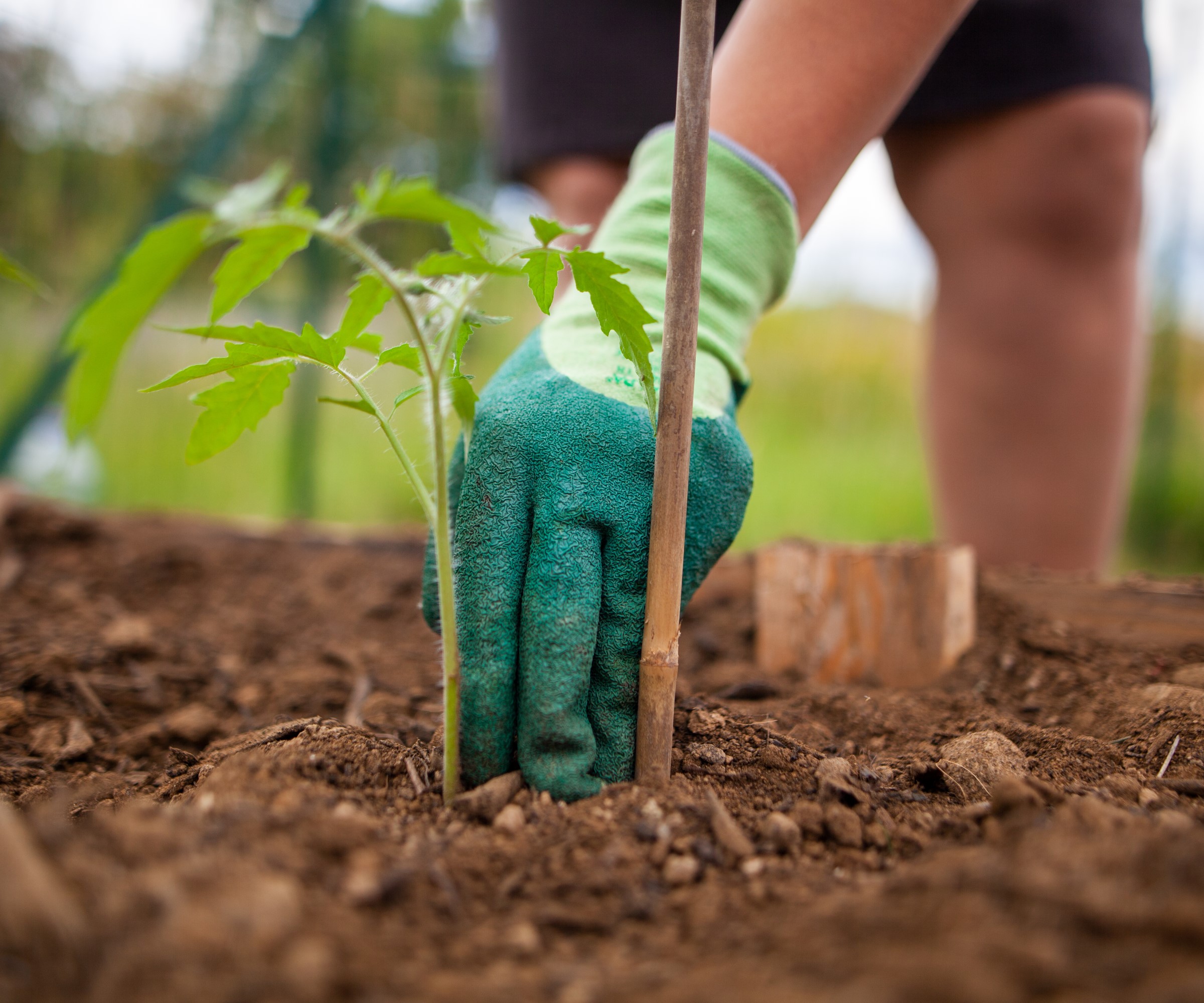
Cordon types of tomatoes need a support to be tied and trained to
FAQs
How deep do you transplant tomato seedlings?
Tomato seedlings should be planted up to the first set of leaves, however tomato plants can be planted deeper if the young plant has got leggy. For example, if the seedlings have reached around 12 inches, then you can plant it up to eight inches deep, providing you remove any lower leaves that would be under the ground.
A rule of thumb is that you can plant up to two-thirds of the plant. If you bury the tomato plant deep, then the plant sends out more roots along the length of the stem buried underground. Tomatoes have adventitious roots that are capable of growing along a buried stem and that can even help the plant develop a larger root system.
What happens if you transplant tomatoes too early?
The earlier you transplant any crops out into their final positions, the more they risk being set back, or even killed, by unfavorable weather. This is particularly risky for tomatoes – a plant that adores heat – if they are being grown outdoors. Transplanting them out too early puts them at a much greater risk of dying due to a late frost or a particular cold snap.
Tomatoes can actually survive temperatures down to 33˚F but will suffer below 50˚F from poor, stunted growth and reduced flowering and cropping. If you want to check when to transplant tomato seedlings, always monitor the local weather and keep a close eye on the night-time temperatures.
Knowing when to transplant tomato seedlings is a key aspect to growing the best tomato plants. The seedlings need the space in their own pot to grow healthy and strong, making sure they are in the best shape for when they get planted into their final position.
If you want to know when to pot up tomato seedlings, keep an eye on their leaves as they develop and look out for those first true leaves. Potting up plants is an enjoyable task and watching your seedlings grow on can be a very satisfying experience. If you have the strongest tomatoes to plant out in your kitchen garden then they will be perfect for growing a good crop of juicy fruits for you to enjoy.

Drew has worked as a writer since 2008 and was also a professional gardener for many years. As a trained horticulturist, he worked in prestigious historic gardens, including Hanbury Hall and the world-famous Hidcote Manor Garden. He also spent time as a specialist kitchen gardener at Soho Farmhouse and Netherby Hall, where he grew vegetables, fruit, herbs, and cut flowers for restaurants. Drew has written for numerous print and online publications and is an allotment holder and garden blogger. He is shortlisted for the Digital Gardening Writer of the Year at the 2025 Garden Media Guild Awards.